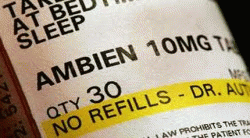A recent study reports that the 6% to 10% of Americans using prescription sleeping pills such as zolpidem (Ambien), temazepam (Restoril), eszopiclone (Lunesta) and zaleplon (Sonata) are up to 35% more likely to develop some form of cancer, and far more likely to die prematurely, than those who take no prescription sleep aids whatsoever.
"We were pretty startled by the findings," says Robert Langer, one of several authors of the study, which was published in BMJ, a British medical journal owned by the British Medical Association. "Since we started trying to qualify the results of this analysis about a year ago, I'll tell you, my prescription bottle for Ambien has sat on the shelf unopened."
The biggest challenge for people taking Ambien and other sleep medications, is that stopping or even reducing the dose can cause even more insomnia. The clinical term for this is called "rebound insomnia" and usually means little to no sleep for four to up to ten days, depending upon the dose and duration of use. After only two days of no REM, or dream sleep, studies show that people are just as impaired behind the wheel of their car as a drunk driver.
Several other studies show that a non-drug, non-invasive treatment called neurofeedback for insomnia can be of great benefit to those suffering from a lack of sleep. For those with hyper-arousal, or anxiety based insomnia, neurofeedback seemed especially helpful. One theory that's gaining ground is that this hyper-arousal in the brain and central nervous system is simply inherited from one of both of ones parents. In many cases, patients choosing neurofeedback treatment report that at least one parent and several siblings will have similar symptoms. And when those family members also come in for treatment, their brainwave patterns look almost identical to that of the their child.
Neurofeedback, also known as neurotherapy, is simply biofeedback for the brain. The human brain has a whole symphony of electrical activity coursing through it all day, everyday. Through stress and/or trauma, these brainwave can become imbalanced, causing anxiousness, panic attacks and left unattended, insomnia. The good news is that neurofeedback can, over time and with a number of sessions, correct these imbalances and assist greatly in easing the rebound insomnia associated with Ambien withdrawal.
The other unique thing about neurofeedback for insomnia is that with enough reinforcement and training, the results actually hold long term. The human brain is very smart, and when its retrained to operate itself for better rest and less anxiety, it will choose to do so, eliminating the need for on-going treatment. Life stressors will of course come and go, and so will the occasional bad night of sleep, but the brain and central nervous system will return to the place that neurofeedback has shown it to be the most optimal way to run itself.






